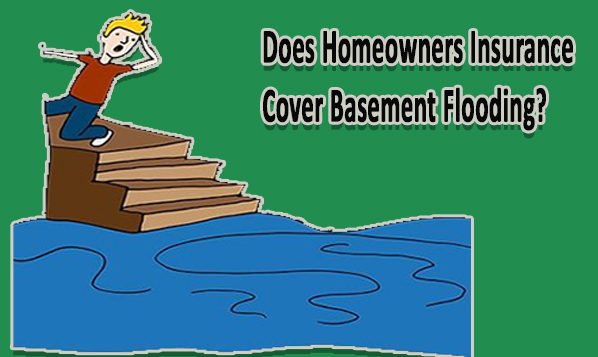Basements are below ground, making your home vulnerable to floods even if it is not close to any bodies of water. Additionally, regions that were not previously affected by flash floods and severe rains are at risk as extreme weather events grow more frequent. This would make you wonder if your homeowners insurance can cover basement flooding.

Your homeowners insurance policy may cover basement flood damage, depending on the cause of the flooding. Standard home insurance policies do not cover most flood damage, including storm surges, rainfall, snowmelt, and sewer backup. In this article, you can find out if homeowners insurance can cover basement flooding and when.
When Does Homeowners Insurance Cover Basement Flooding
There are several reasons why a basement may flood. Some of these circumstances may be covered by your homeowners insurance policy, while others may not. Standard HO-3 plans do not cover basement flooding caused by rain, storm surges, sewer backup, or snowmelt, despite certain conditions. The following risks are not get coverage from your personal property coverage and are typically listed under dwelling coverage in an HO-3 policy.
Damaged appliances
Homeowner’s insurance typically covers water damage from broken appliances, provided it’s not due to carelessness or poor upkeep. However, if the water heater was outdated and ought to have been replaced, flood damage from a leaky heater might be rejected.
Burst pipes
Home insurance may cover damages caused by freezes or broken washing machine pipes, ensuring your basement floods are covered. However, you must reside in the house, keep the temperature at least bearable (above 60 degrees), and make sure the house is maintained properly. The insurance may reject your claim if they find evidence of carelessness or neglect.
Localized overflow
In most cases, homeowners insurance covers limited overflow, like when a sink or bathtub overflows. As long as it wasn’t the result of carelessness, your policy should pay for the damages because this is regarded as an unexpected and unintentional incident. Your claim can be rejected if your insurance can demonstrate that the flood was caused by an ongoing maintenance issue.
When Does Homeowners Insurance Not Cover Basement Flooding
Standard home insurance policies may not cover basement water damage in certain situations, some of which may come as a surprise. If you’re concerned about any of these happening to you, we’ve broken down some of these possibilities and the kind of coverage you might want to think about.
Natural flooding
Flooding caused by natural events such as hurricanes, severe rainfall, snowmelt, or runoff is not covered by homeowner’s insurance. A second policy or endorsement is required to add flood insurance coverage. Homeowners who reside outside of high-risk zones submit more than 25% of flood insurance claims in the United States. The National Flood Insurance Program (NFIP) and a few commercial insurers offer flood insurance. Your mortgage holder can insist that you have a flood policy if you purchase a home in a flood zone.
Sump pump backups
Generally, sump pump overflows, drains, and sewage backups are not covered by homeowner’s insurance plans. However, you can supplement your policy with a water backup coverage endorsement. Ask about this coverage throughout the quote process if it’s important because not all carriers provide it.
Sewer backup
A useful supplement to homeowners’ insurance plans is sewage backup insurance, which covers floods brought on by external sewer backups. Usually obtained with the same endorsement as sump pump backups, this coverage is provided by the insurance carrier as an endorsement. However, it usually won’t be covered if the backlog was brought on by an external sewer that involved outside pipes. Therefore, sewer backup insurance is a beneficial extra for homeowners.
Seepage issues
Basement flooding can occur due to seepage in homes with broken foundations or those built on land with high water tables. Homeowners insurance does not cover water seeping into your basement due to foundation faults or inadequate landscaping drainage. This is regarded as a maintenance issue, which is the homeowner’s duty and is not covered by your policy.
Maintenance or neglect
Damage from negligence or poor maintenance, such as rusty pipes or broken appliances, is not covered by homeowner’s insurance. Your claim can be rejected if insurers can demonstrate that you were careless in maintaining your house and its possessions and that you failed to reduce water damage right away. This is true for outdated appliances, leaking pipes, and rusted pipes.
Will Additional Flood Insurance Protect My Basement
To cover against outside floods causing water damage to your basement, you might be able to get a separate flood insurance policy. If you live in a location where flooding is a major risk, you may need flood insurance. Be aware that not all flood insurance policies cover areas below ground level, so find out how you’re covered by your policy by contacting your insurer.
How to Reduce Basement Flood Risk
Homeowners are at serious risk from basement flooding, which can destroy belongings, necessitate expensive repairs, and make a portion of your house unusable. To reduce this risk, protect their basements from flooding, and lessen the possibility of damage from too much water, homeowners should take some preventative steps.
The following are important actions to lower the risk of basement flooding:
- Make sure the area surrounding the foundation is graded appropriately to divert water and avoid pooling.
- Install and maintain a working sump pump system to get rid of extra water.
- To stop water seepage, seal foundation wall cracks.
- To guarantee adequate drainage, expand gutter downspouts and direct them away from the foundation.
- To avoid sewage overflow during periods of high rainfall, think about installing a backwater valve.

